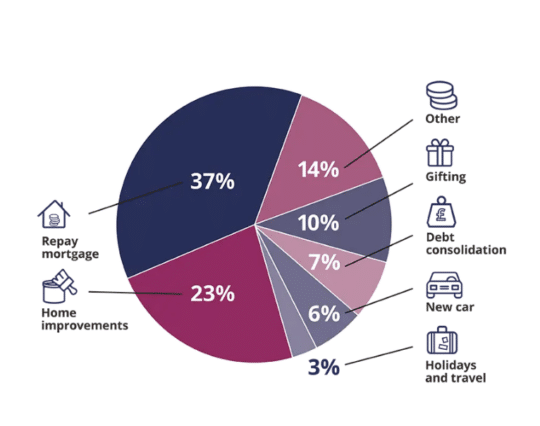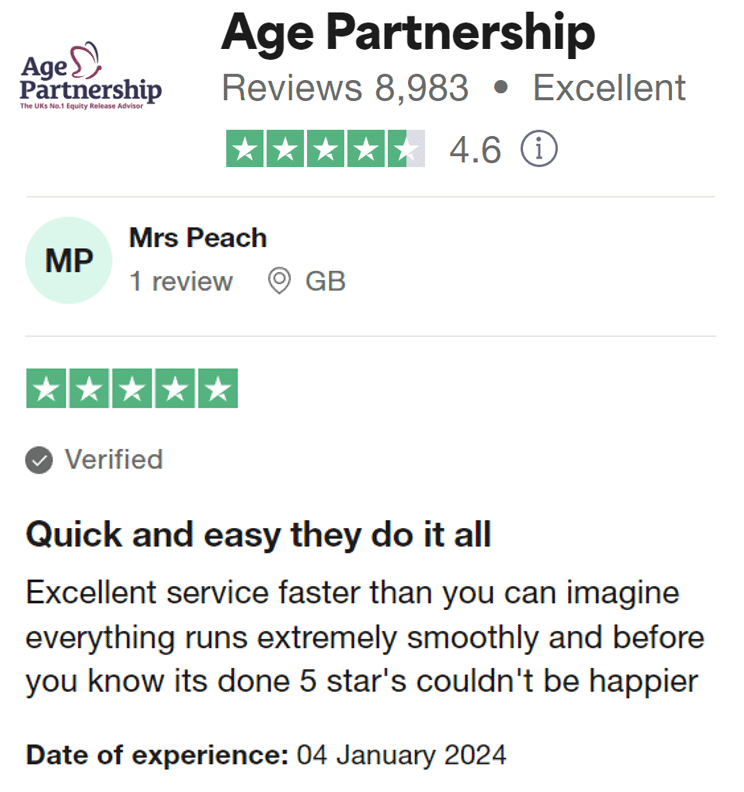Home Reversion Plan vs Lifetime Mortgage – Which Is Better?
Our preferred equity release adviser is Age Partnership. For free and impartial money advice you can visit MoneyHelper.

Our preferred equity release adviser is Age Partnership. For free and impartial money advice you can visit MoneyHelper.
Choosing between a home reversion plan and a lifetime mortgage can be a tricky task. You’re in the right place if you want to understand these options better.
Every month, over 7,000 people visit our website looking for guidance on topics like equity release. It’s normal to feel worried about money, debt, and making the right choices.
In this article, we’ll cover:
- What a lifetime mortgage is and how it works
- The basics of a home reversion plan
- The differences between a lifetime mortgage and a home reversion plan
- Who can apply for these options
- The pros and cons of each choice
Some of us have been in your shoes, trying to find the best way to use our home’s value to help our finances.
With the right information, you can make a choice that fits your needs. Let us help you understand your options better.
What is a lifetime mortgage and how does it work?
A lifetime mortgage is one of the two types of equity release loans in the UK. They work by providing a loan and charging the loan with monthly interest. However, even the monthly interest does not need to be paid back each month. Instead, the interest “rolls up” to make the debt grow bigger over time.
The amount owed at the point of death or moving into long-term care is how much will be taken from the money raised from the property sale.
Who qualifies for a lifetime mortgage?
To qualify for a lifetime mortgage you must be at least 55 years old, although waiting until you are older could secure a better interest rate. You may need to be below a certain age to get a lifetime mortgage. For example, Nationwide only accept applications from homeowners between 55 and 84 years old. These age restrictions apply to all homeowners.
The equity released must be from your main residence and this property must have no debts secured against it, which includes a residential mortgage. You’ll need to have paid your mortgage and any other secured home loans off before applying in the majority of cases. Some lenders may allow you to apply with a small outstanding mortgage on the condition that some of your cash lump sum is used to pay off the debt first.
The advantages of a lifetime mortgage
The pros of using a lifetime mortgage to fund your retirement are:
- The money is not taxed
- The money can be spent on anything without restrictions
- The loan requires no ongoing repayments
- You can access up to 60% of your equity
- You continue living at your home
- You can volunteer to make interest repayments to lower your debt to increase the value of your estate and pass on more wealth
» TAKE ACTION NOW: Find out how much equity you could release
Lifetime mortgage example
Lifetime mortgages are best understood with an example.
Let’s imagine Julie and John are both 65 years old and have taken out a lifetime mortgage of £65,000 as a tax-free cash lump sum. This is 33.33% of their available home equity because their home’s current full market value is £195,000 and they have no debts attached to the property. They agree to a fixed interest rate of 6.4%.
After 10 years, John passes away leaving Julie to live in the property on her own. Two years later, Julie also passes away and the lifetime mortgage needs to be repaid through the sale of the property.
The property is sold for its new full market value, which is £235,000. This money is used to first repay the lifetime mortgage lender. But the debt owed is now much bigger than £65,000. Due to the rolled-up interest of 6.4% over 12 years, the total owed is just below £137,000.
This means the £235,000 raised from the property sale will be deducted by almost £137,000 to repay the lender, leaving £98,000 (minus fees etc.) to Julie’s estate beneficiaries.
What is the difference between a lifetime mortgage and equity release?
Equity release includes two different types of loans. One of them is a lifetime mortgage. Therefore, all lifetime mortgages are a type of equity release, but not all equity release loans are lifetime mortgages.
At the same time, it is important to distinguish between equity release and releasing equity. Releasing equity is borrowing money against the equity in your home, whereas the similarly named equity release is a method of borrowing against home equity exclusive for seniors over 55. As such, equity release is just one way of releasing equity for a proportion of the population.
How equity release could help
More than 2 million people have used Age Partnership to release equity since 2004.
How your money is up to you, but here’s what their customers do…
Find out how much equity you could release by clicking the button below.
In partnership with Age Partnership.
What is a home reversion mortgage?
The other type of equity release loan available in the UK is a home reversion plan, also called a home reversion scheme. Home reversion plans are not as widely available or as popular as lifetime mortgages, but they remain an option that you can discuss with an equity release financial adviser.
The home reversion scheme allows senior homeowners to access their equity as a loan without having to pay any interest on the loan. The home reversion plan provider makes a profit on the loan by getting the homeowner to agree to give them a fixed percentage of the future property sale, which is greater than the percentage of equity released.
The property is only sold to repay the home reversion debt when the last surviving homeowner dies or moves into long-term care, as is the case with a lifetime mortgage.
Who qualifies for a home reversion scheme?
The criteria to qualify for a home reversion plan is almost identical to the criteria to qualify for lifetime mortgages. But even though you can get a home reversion plan at 55, many home reversion providers require the youngest homeowner to be at least 65 years old.
The other criteria remain the same, such as only releasing equity from a main residence without any outstanding debts secured against the property.
Are home reversion plans safe?
Home reversion plans are safe as long as you choose a home reversion plan provider that is not a scam company. This means seeking home reversion companies that are authorised and regulated by the Financial Conduct Authority.
For additional assurances and peace of mind, it is best to consider home reversion plans that are offered by Equity Release Council members. All members must be authorised and regulated by the Financial Conduct Authority, so it ticks both boxes at once.
Learn more about the Equity Release Council later in this guide!
Home reversion plan example
Just like lifetime mortgages, home reversion plans are best understood with a simple example.
Ronald and Kathleen are in their 70s and own a property worth £300,000. They want to release equity to pay for private medical treatments and to help their children get on the property ladder with a better mortgage deal. So, they decide to take out a home reversion plan worth 25% of their equity, which in this case equates to £75,000.
They receive this loan as a tax-free lump sum. But in return, they have agreed with the home reversion plan provider that they can have 80% of their property’s future sale value.
So when the last surviving partner out of Ronald and Kathleen moves into care or dies, the property will be sold and 80% of the money will be given to the lender, leaving 20% to be given back to them or put back into their estate.
If the market value of their property remains the same, they will have to pay £240,000 back for their initial £75,000 lump sum loan. However, the exact amount to be repaid can change depending on if the market value of the property decreases or increases.
Join thousands of others who release equity
Age Partnership have helped over 2 million people release equity from their home.

Mrs Wareham
“I am more than pleased to have taken out Equity Release with Age Partnership.”
Reviews shown are for Age Partnership. Search powered by Age Partnership.
The pros and cons of a home reversion plan
Home reversion plans come with positives and drawbacks. Here are the main ones:
Pros of home reversion plans
- Release up to 80% equity in the best-case situation
- The money is tax-free
- The money can be spent on anything you want
- There are no monthly repayments
- Continue living at home as normal and rent-free
Cons of home reversion plans
- Expect to pay back more than double the initial loan back
- The debt grows instantly rather than gradually
- Taking a lump sum can affect eligibility to receive means-tested benefits
- The set-up costs, including a financial advice service, can cost thousands
The difference between a lifetime mortgage and home reversion plan
Lifetime mortgages and home reversion plans are both types of equity release loans. They work in the same way in many regards by not requiring monthly loan payments, and they only get repaid through the money raised from a property sale after death or moving into long-term care. But they are also different.
The main difference between lifetime mortgages and home reversion plans is the way in which the lender makes a profit on the credit agreement. Whereas a lifetime mortgage charges interest to grow the debt gradually over time, a home reversion scheme exchanges a percentage of equity as a loan for a fixed percentage of the future property’s sale proceeds.
Home reversion plan vs lifetime mortgage – which one to choose?
The only way to know which is better out of a home reversion scheme or lifetime mortgage is to speak with a financial adviser and have them assess your personal circumstances. Some of the key considerations when making this decision are:
- In general, a home reversion scheme can allow homeowners to release more equity, but not always. This may not be needed either.
- Lifetime mortgages gradually grow the total owed and present less risk than home reversion plans.
- Home reversion schemes provide slightly more assurance about how much you are likely to repay in the future. Although this is not completely accurate because your property market value could (significantly) change.
Other equity release FAQS
Is equity release taxed?
The money received from an equity release plan, whether that be a lifetime mortgage or home reversion plan, is not subject to tax. This is because both of these are loans, despite the lack of monthly repayments making them feel like they are not. Loans are not subject to taxation.
If you receive an equity release loan and give the money away, these financial gifts can be subject to inheritance tax if you die within seven years of giving the money away. Thus, equity release is not a risk-free way of mitigating inheritance tax and is best discussed with financial advisory services.
Does equity release affect your state pension?
Equity release does not affect your eligibility to receive a state pension. But increasing your wealth and keeping it in the bank can affect your eligibility to receive means-tested benefits, such as Universal Credit or Pension Credits.
What is drawdown equity release?
Drawdown equity release is when the equity release loan is paid out as a drawdown facility instead of a lump sum payment. This means the homeowner can access the loan in instalments as they need over a set period. Drawdown equity release can be possible with both home reversion schemes and lifetime mortgages.
There are many reasons why somebody may prefer to receive the loan as a drawdown facility. It could be something simple as wanting to help budget, especially if the money is used for home renovations. Or it could be used to reduce the amount of rolling interest building up.
But the most common reason for choosing drawdown equity release plan is to avoid increasing personal wealth significantly and that has a knock-on effect on any means-tested benefits, as discussed above.
What is the Equity Release Council?
The Equity Release Council is a voluntary membership group welcoming financial service providers and equity release lenders to join. These companies must be authorised and regulated by the Financial Conduct Authority to become members.
All members become more attractive service and loan providers when they are a member of the group. This is due to the rules and guidelines that those members must agree to, many of which have been created to offer further protection and assurances to homeowners taking out the loan.
What is the negative equity guarantee?
The negative equity guarantee is one of the rules that members of the Equity Release Council must agree to. It states that any lifetime mortgage debt cannot outgrow the value of your home when it is sold to repay the debt.
For example, if your property sells for £200,000 but your lifetime mortgage debt is £210,000, then the lender cannot try to recover the £10,000 shortfall, i.e., you cannot be put in a position of negative equity.
Do you need equity release advice first?
Yes, you must receive equity release advice before making an application. This advice may come from an independent adviser who may also offer an equity release brokerage service to help you find the better deals. Or it can come from an advisor who works directly for a lender and must provide a service before they can agree to the loan.
During your consultation, everything must be explained in full, including long-term costs and implications of equity release. They should also explore any alternative options so you can avoid using equity release if possible.
How much does equity release cost?
The overall cost of applying and setting up an equity release loan can cost thousands of pounds. This is because equity release advice and solicitor services can cost at least £2,000, and there may be further application fees to consider.
Is equity release a con?
Equity release is not a con but is sometimes considered as such because of how expensive these loans are to repay. In both of our examples on how home reversion plans and lifetime mortgages work, the cost of repaying these loans are x2 or even x3+ the initial loan amount.
Things to consider
Equity release will involve a home reversion or a lifetime mortgage, which is secured against your property and will reduce the value of your estate and impact funding long-term care. Our equity release partner, Age Partnership provides a personalised illustration to explain the full details. The money you release, plus the accrued interest is then repaid when you die or move into long-term care. Advice is required before proceeding with equity release and any existing mortgage must be repaid. Age Partnership provide initial advice for free and without obligation. Only if your case completes would Age Partnership’s advice fee of £1,895 be payable. Other lender and solicitor fees may apply.




